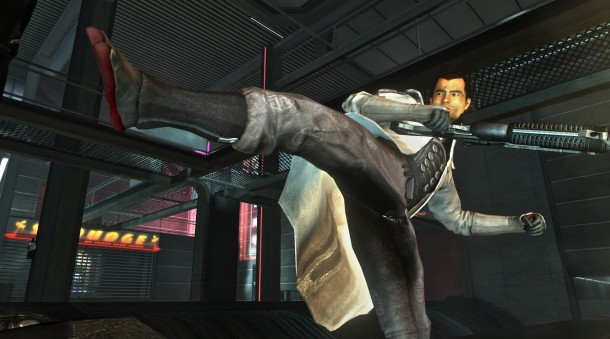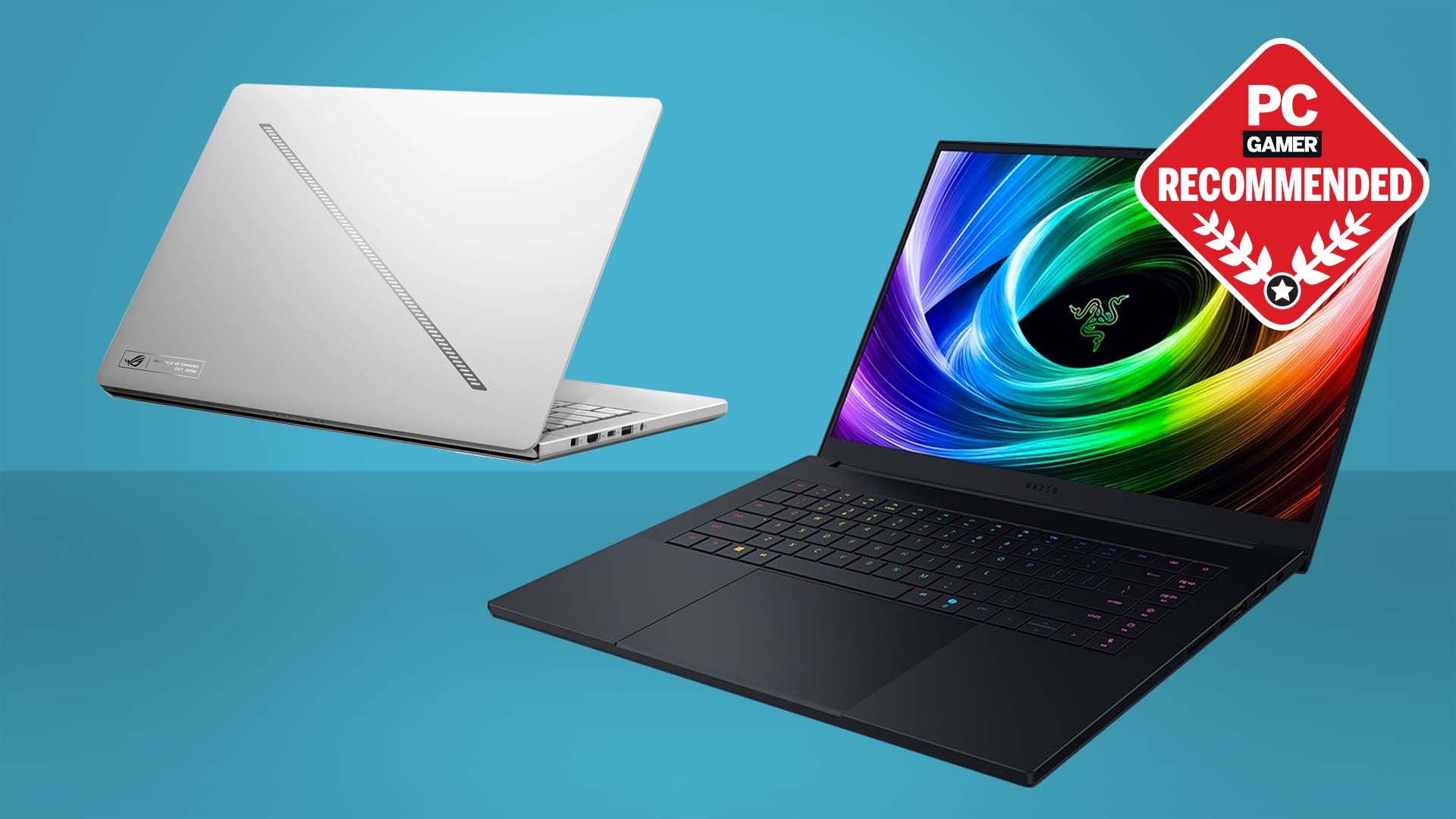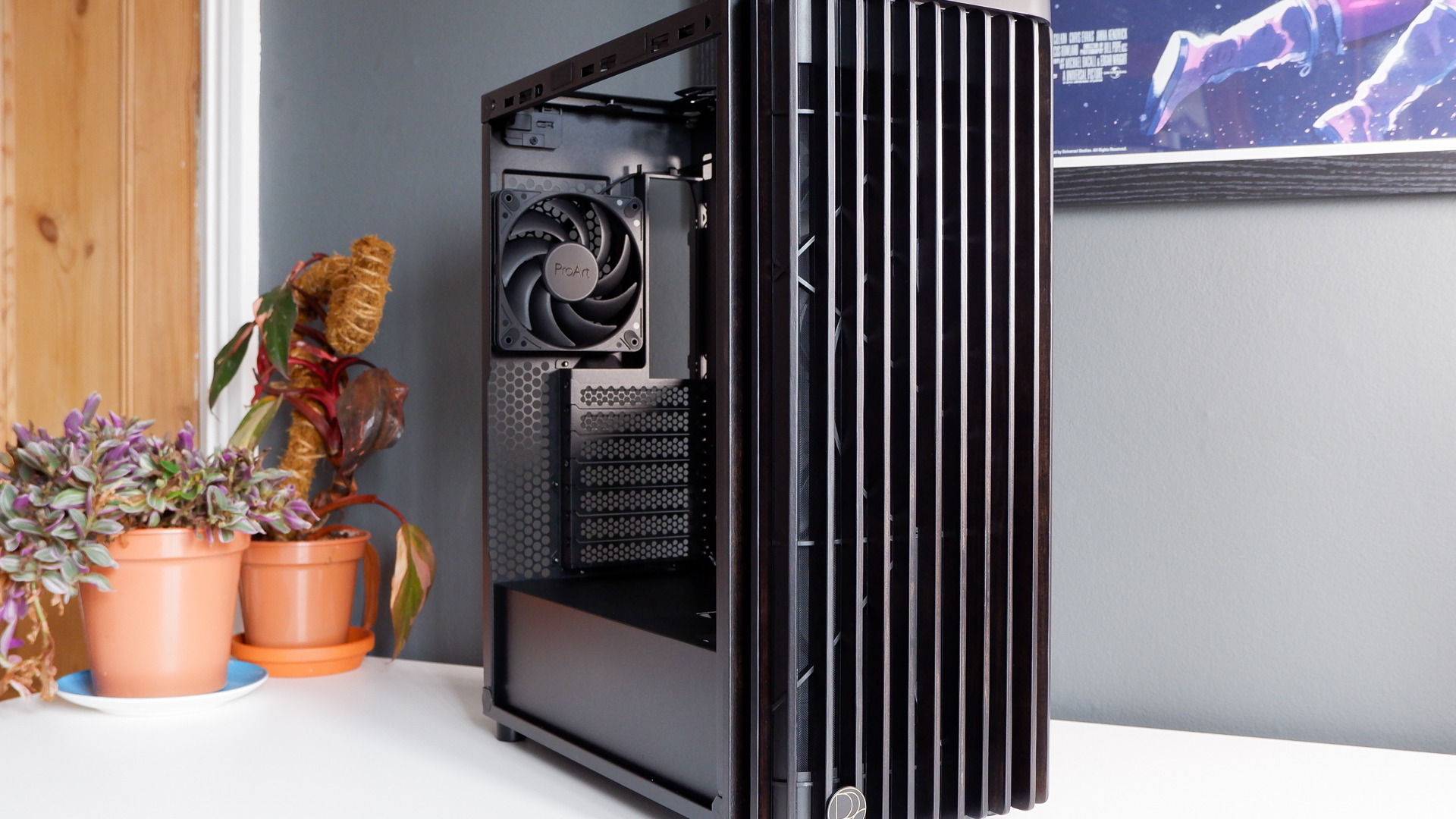Our Verdict
Syndicates confused storyline gives way to passable shooting overlaid with a pointless layer of hacking frippery.
PC Gamer's got your back
Somewhere between the roomfuls of civilians cowering from his indiscriminate firstperson weapons fire, and his best work pal putting bullets into the skulls of an entire train's worth of helpless innocents, you'd think Syndicate enforcer Miles Kilo would have worked out that his employers Eurocorp were not entirely ethical.
But the silent Miles is either pathologically selfish or as dopey as a biomechanically enhanced brush: he doesn't care about his company's inhumanity until it's directed squarely at him. He just wades through near-future offices, doing the shooty bidding of his bosses, until the story takes a personal turn.
Syndicate's twist is delivered via flashback, and the message is so gobsmackingly obvious that I wanted to grab Miles and shake him until his brain rebooted. Remember that giant, world-conquering megabusiness that has its security staff root around inside the brains of its rivals' employees that you work for? Turns out they're not very nice.
Eurocorp send Miles off to infiltrate other syndicates. He seems to hold his morals lightly. He has no problem shooting hundreds of people in the name of a paycheque and a snazzy coat, but when Alyx Vance-lite Lily Drawl alerts him to some repressed memories, he's just as happy to switch his allegiance and help out a raft of unaugmented types he's never spoken to. The biggest difference between these folk and Miles – bar the coat (seriously, it's a really nice coat) – is in their heads. Half of humanity is as nature intended, whereas Miles' more upwardly mobile types have had their brains implanted with chips.
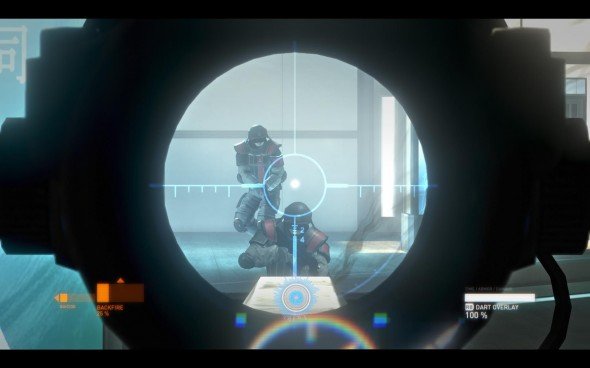
For the general human, these chips enable access to the dataverse – which presumably streams future- QVC and on-demand pornography direct to your cerebral cortex. Miles, however, has DART 6, a weaponised version of this chip that gives him a set of murderous skills that work alongside an item identification overlay that takes five seconds to scan and label a bin as 'bin'. Welcome to the future! Sadly, for much of the game the skills Miles' special chip unlocks are similarly redundant.
He's got three main ones. Suicide convinces an enemy to yank out a grenade, prime it, and hold onto it. Backlash detonates the ammunition in a weapon, jolting the victim and making them susceptible to attack. Persuade convinces an enemy to join your cause and kill his friends, before turning his rifle on himself. All are darkly funny in application – the sadness of a persuaded foe goaded into killing himself is palpable through several layers of body armour – but they're not different or useful enough to replace sustained gunfire as your weapon of choice. Both Backlash and Suicide are mechanically similar, providing an area of effect attack of varying strength. Persuade is more applicable in a tight spot, giving you a moment of freedom as a room retargets their weapons on a former colleague.
All skills cost different amounts of adrenaline to use. Backlash is the cheapest, and I used it by far the most. Deployed properly, it kicks enemies out of cover and weakens them, allowing them to be killed with one or two follow-up shots. Without it enemies are meat-shields, taking half a clip of Syndicate's standard TAR assault rifle without flinching.
Keep up to date with the most important stories and the best deals, as picked by the PC Gamer team.
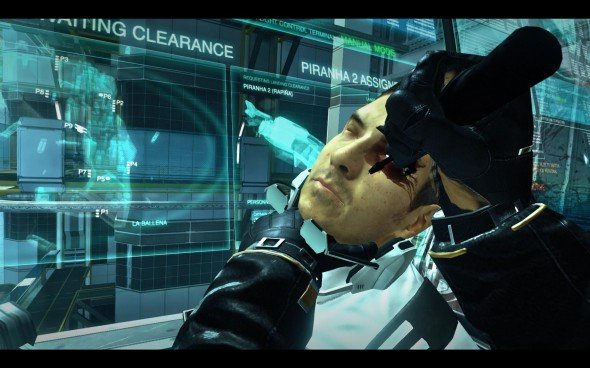
Some foes add another layer of defence, piling crystalline armour over their standard figure-hugging ensemble. You need to breach this protective layer before these miniboss enemies can be put down permanently. Developers Starbreeze want you to think cleverly to undo this second skin, but the solution isn't particularly graceful: hide behind a wall, hold an arbitrary key – E, using the default controls – and go about your murderous business as you would on a standard enemy.
More tiresome are the game's legion of flying foes. Syndicate has a strange affection for the shooter's most hateful of baddies, seasoning the game liberally with airbound drones and droids. Most are equipped with personal shields, meaning I had to pop out of cover and take a few chaingun rounds in the face before my DART chip agreed that the bastard shooting at me was worthy of targeting, and gave me the option to knock out its defences. Moments of personal impressiveness, where I was able to manipulate both the environment and my enemies with my supposed range of powers, were few and far between. More common was a clumsy death behind a cheerfully identified bin. Syndicate is riddled with oddly tough difficulty spikes, even on normal settings: I had to replay one section chock-full of drones and soldiers over and over, spending most of my 40-odd minutes alternating between loudly swearing and exasperatedly gurning at a screen coloured about-to-die red.
But standard fights pale in comparison with the facepunching frustration of the game's bosses. Syndicate generously shares its nearfuture setting and theme of transhumanism with Deus Ex, but it also has that game's awful approach to boss fights, augmenting them to make them even worse. The resulting battles are uniformly painful in their own special ways. The first boss is a teleporting bullet sponge, who is closer to an MMO raid boss in terms of his health bar and the time investment it takes to kill him. A later example fires swathes of heat-seeking rockets that demand multiple mid-air breaches in the space of a few milliseconds. One of Syndicate's last bosses treats you to a circular chase around a server farm that should be underscored with the Benny Hill theme tune, but gets pumpingly naff dubstep instead.
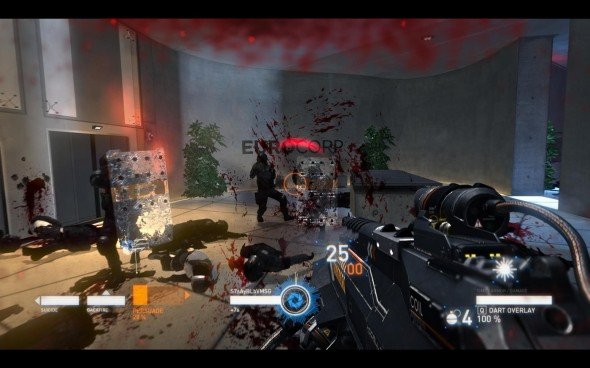
I came to rely on Syndicate's best feature to win all my fights. Press Q and Kilo's view switches, giving him a grey and orange vision of a sloweddown world. This DART overlay mode makes accurate targeting possible – a real problem when the PC version of the game is cursed with horrible mouse smoothing issues that make your reticule feel like it's moving full seconds after your hand. It also reduces damage taken and increases the damage you dish out during gunfights.
DART overlay is the glue that allows you to chain together the kind of rampage the chip's skills don't encourage. With liberal application of Miles' cyberpunk-eye-view, I made Syndicate's firefights passable, if not consistently thrilling, against FPS competitors. The best battle moments come towards the end of the game: comfortable with all my talents, and aware – if not pleased – with Kilo's easy mortality, I was able to chain together kills, breaches, suicides and slow-motion neck snaps to make combat enjoyable.
Syndicate is rarely willing to let you have such fun. I was drip-fed the three lethal DART 6 skills and, just as I got used to their application, two were snatched back halfway through the game, leaving me with Backlash – the most boring of the three – for a few stages. Later, jammer enemies restrict the use of Miles' chip, forcing you to turn to direct weapons fire. Why give players these powers if your intention is to take them away shortly after?
Even control of Miles is whipped away from you at regular intervals, as the game marionettes him through a set of pre-canned animations. The most galling of these had my character incredulously staring at every single appendage he owned as he was strapped into a machine. It feels like you're inhabiting the brain of a particularly dextrous and brutal baby, discovering his hands and legs for the first time.
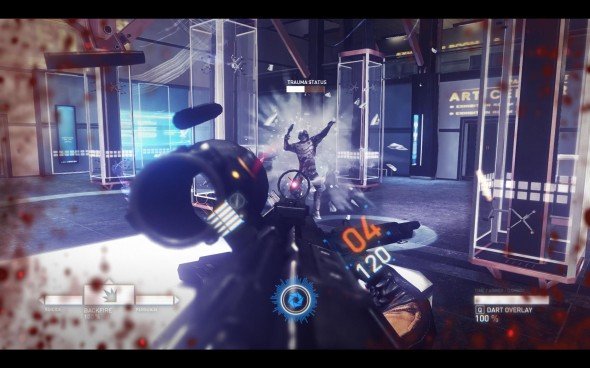
There's more freedom to be had in the cooperative mode. This plonks you in as one of four Syndicate agents sorting out various corporate messes across the globe. Players conform to one of three archetypes – assault, defence and support – but loadouts can be customised with different weapons and abilities.
Those in turn can be upgraded with repeat playthroughs of the generous number of missions on offer. The range of abilities make more sense in Syndicate's multiplayer: as a support class, I was able to buff my teammates with shields before a boss, healing them en masse as he knocked through their extra armour. There's a level of tactical challenge during this co-op mode that the singleplayer is lacking, and it will offer more longevity than that eight-hour campaign ever could.
Syndicate feels, well, troubled. Mechanically it's nothing like its lauded predecessor, but the tone has changed too. 1993's Syndicate embraced the shadows of its brutal dystopian darkness; 2012's version tries to wash them out with crooked morality and oversaturated bloom effects. The result is a game that doesn't understand itself, providing you with an unexceptional shooting experience that feels as naive and muddled as its protagonist.
Syndicates confused storyline gives way to passable shooting overlaid with a pointless layer of hacking frippery.
